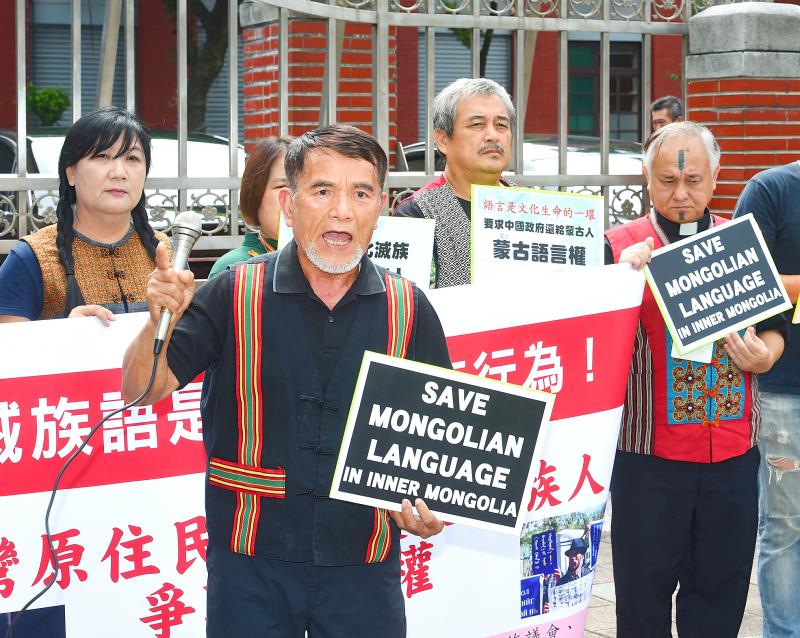Aboriginal groups yesterday voiced support for the people of Inner Mongolia, saying that China is to blame for protests because it is suppressing Mongolian language and culture in the region.
Chinese education officials in the region have barred classes in subjects other than the Mongolian language from being taught in anything but Chinese.
Students and teachers have decried the policy, with many not attending class in protest.

Photo: Fang Pin-chao, Taipei Times
At a rally outside the Legislative Yuan in Taipei, the Tayal National Assembly, the Indigenous Peoples’ Action Coalition of Taiwan, the Association for Taiwan Indigenous Peoples Policy and other organizations denounced what they called China’s policy of “cultural genocide.”
Rukai Legislator Saidai Tarovecahe of the Democratic Progressive Party told a news conference at the rally that mother tongues are the essence of knowledge of the natural environment, and for understanding life and the world.
“The fastest way to wipe out an ethnic group is to cut them off from their mother tongue,” she said.
“It is regretful that China’s authoritarian regime is adopting an assimilation policy against its ethnic minorities,” she said.
“A living Aboriginal language is like an identity card for us. If the language dies, then Aborigines would also die,” said former Council of Indigenous Peoples minister Yohani Isqaqavut, a Bunun, who is now a Presbyterian pastor and part of the church’s Taiwan Indigenous Ministry Committee.
“Aboriginal cultures, languages and traditions were suppressed” under the assimilation policies of the former Chinese Nationalist Party (KMT) regime, he said.
“It forced them to identify as Han Chinese ... so I can understand what the people of Inner Mongolia are going through right now,” he said.
“China has been promoting the use of Chinese while it is eradicating the mother tongue of ethnic minorities — which denies the basic rights of these people,” he said.
“We want to raise awareness of this issue and to protest against this shameful policy of the Chinese regime,” he said.
Independent Legislator Freddy Lim (林昶佐) said that people in China should have the same freedoms as Taiwanese.
“As a proud father of a three-year-old daughter, I want her to speak our mother tongue freely at kindergarten,” Lim said. “The actions of the Chinese government is to totally suppress the learning environment for Mongolian children, which will lead to the extermination of ethnic Mongolians in the region.”
“I urge countries around the world to support Inner Mongolia, and defend Mongolians’ right to their mother tongue,” he said.

EUROPEAN TARGETS: The planned Munich center would support TSMC’s European customers to design high-performance, energy-efficient chips, an executive said Taiwan Semiconductor Manufacturing Co (TSMC, 台積電), the world’s largest contract chipmaker, yesterday said that it plans to launch a new research-and-development (R&D) center in Munich, Germany, next quarter to assist customers with chip design. TSMC Europe president Paul de Bot made the announcement during a technology symposium in Amsterdam on Tuesday, the chipmaker said. The new Munich center would be the firm’s first chip designing center in Europe, it said. The chipmaker has set up a major R&D center at its base of operations in Hsinchu and plans to create a new one in the US to provide services for major US customers,

The Ministry of Transportation and Communications yesterday said that it would redesign the written portion of the driver’s license exam to make it more rigorous. “We hope that the exam can assess drivers’ understanding of traffic rules, particularly those who take the driver’s license test for the first time. In the past, drivers only needed to cram a book of test questions to pass the written exam,” Minister of Transportation and Communications Chen Shih-kai (陳世凱) told a news conference at the Taoyuan Motor Vehicle Office. “In the future, they would not be able to pass the test unless they study traffic regulations

GAINING STEAM: The scheme initially failed to gather much attention, with only 188 cards issued in its first year, but gained popularity amid the COVID-19 pandemic Applications for the Employment Gold Card have increased in the past few years, with the card having been issued to a total of 13,191 people from 101 countries since its introduction in 2018, the National Development Council (NDC) said yesterday. Those who have received the card have included celebrities, such as former NBA star Dwight Howard and Australian-South Korean cheerleader Dahye Lee, the NDC said. The four-in-one Employment Gold Card combines a work permit, resident visa, Alien Resident Certificate (ARC) and re-entry permit. It was first introduced in February 2018 through the Act Governing Recruitment and Employment of Foreign Professionals (外國專業人才延攬及雇用法),

‘A SURVIVAL QUESTION’: US officials have been urging the opposition KMT and TPP not to block defense spending, especially the special defense budget, an official said The US plans to ramp up weapons sales to Taiwan to a level exceeding US President Donald Trump’s first term as part of an effort to deter China as it intensifies military pressure on the nation, two US officials said on condition of anonymity. If US arms sales do accelerate, it could ease worries about the extent of Trump’s commitment to Taiwan. It would also add new friction to the tense US-China relationship. The officials said they expect US approvals for weapons sales to Taiwan over the next four years to surpass those in Trump’s first term, with one of them saying